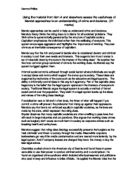Using material from Item A and elsewhere, assess the view that the growth of religious fundamentalism is a reaction to globalisation.
Sunday, 20 April 2014 Liam Curran Year 13
- Using material from Item A and elsewhere, assess the view that the growth of religious fundamentalism is a reaction to globalisation.
Globalisation is the idea that the world is getting smaller, through inter connectedness, different societies are becoming a lot closer to each other through technology and the media as well as transport. Fundamentalism, according to some sociologists such as Huntington, is the challenge to globalisation, returning to the roots of their religion where the core beliefs are still in practice. Some people associate fundamentalism with violence, as was the case with the 9/11 attack, but this view has been criticised by many, because not all fundamentalist groups adopt violent methods, for example creationists.
Anthony Giddens argues that fundamentalism is in fact a reaction to globalisation because with globalisation comes what’s called, cosmopolitan religion which provides choice in many different areas of life, such as diversity, sexuality, careers etc, and because of this choice there is an element of uncertainty. Globalisation provides the necessary components to adapt to a postmodern world, and the fundamentalism is to refuse the adaptation, and return to the roots of their faith, and their faith only. Fundamentalism provides certainty where there is none in a globalising world, by referring back to the scripture of their religion where there are strict doctrines interpreted by chosen ministers of that faith. Without globalisation, there wouldn’t be such an emphasis on fundamentalism as Giddens argues it is a relatively new term, indicating that it’s use is largely used to describe the many movements that are combating new age thinking. Bauman agrees with Giddens suggesting his own argument that postmodernity has increased the risk of making free choices, and some choose to adopt this new lifestyle whereas others associate themselves with movements of tradition and grounded truth. Examples of fundamentalist attacks on modern western society can be seen in the 9/11 attacks and various other vicious attacks between the east and west.








